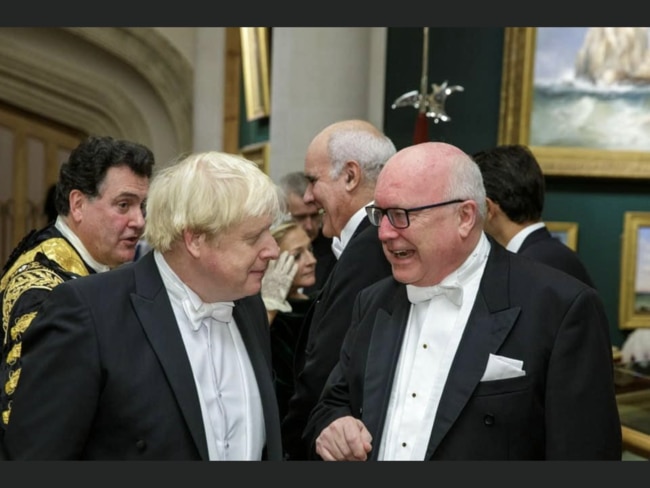Des Houghton: UK wine tax outrage leaves growers’ hopes in the hands of two Queenslanders
The British Government is set to punish Australian wine producers because some plonker in Her Majesty’s Treasury has dreamt up a new tax, writes Des Houghton. That is unless two Queenslanders can change Boris Johnson’s mind.
Opinion
Don't miss out on the headlines from Opinion. Followed categories will be added to My News.
The British Government is set to punish Australian wine producers and thousands of small grape growers all because some plonker in Her Majesty’s Treasury has dreamt up a new tax.
I see it as a monstrous betrayal of the Australia-UK Free Trade Agreement signed with great hoopla days before Christmas last year.
A new tax regime proposes higher taxes on wines with a higher alcohol content, making our wines less competitive and wiping out the gains promised by the Australian and British governments under the historic free-trade deal.
It seems small farmers and big companies will both be shafted unless two Queenslanders can change Boris Johnson’s mind.
They are Villanova old boy and former Attorney-General George Brandis, now High Commissioner in London, and Brisbane Grammar old boy Tony Battaglene from Bell on the Darling Downs. Battaglene is CEO of Australian Grape and Wine, an association that speaks for Australia’s 2500 winemakers and more than 5,000 wine grape growers.
The proposed tax comes at a time when the industry was pinning its hopes on a resurgence in exports to Britain to make up the shortfall from the capricious 2020 Chinese import ban that wiped $1bn off the value of our wine exports.

Britons who like our wine will suffer too. Price hikes will hit their favourite brands like Penfolds, Wynns, Wolf Blass, Lindeman’s, St Hallett and Jacob’s Creek. And Australian family companies with exports to the UK like Yalumba, Brown Brothers and Casella will also suffer. Unless it can be stopped, the new tax will increase the cost of beverages with an alcohol content higher than 11.5 per cent.
Under the free trade agreement, tariffs on wine will be cut by 20p (38c) a bottle, but the new tax system is set to increase prices by up to 68p ($1.28) for wine with a 15 per cent alcohol content.
The impact cannot be underestimated. The new tax means 93 per cent of Australian wines sold to the UK will increase in price.
The UK is Australia’s biggest wine export market. Latest figures show we sent 251 million litres worth $460m to the UK last year.
With brands like Penfolds, Wolf Blass, Wynns, Seppelt, and Rosemount, our leading vintner Treasury Wine Estates is rightly upset.
A majority of TWE wines have an alcohol content of between 12 and 15 per cent. Prissy little European wines have a far lower alcohol level, so the new regime is unfair.
The free trade agreement was described as the most significant bilateral trade agreement the UK Government has struck since leaving the European Union.
As part of the FTA, Australian wine growers were due to receive a $50 million reduction in tariffs. Instead, they face a $150 million bill.
UK Foreign Secretary Liz Truss visited Australia recently on a mission “to build relations” with Australia. You could have fooled me.
She said quite rightly that Britain had sovereignty over its own taxes. But she sounded arrogant and obstinate when she said so.
Australia’s 2500 wine producers are mostly small family-owned operations who will suffer most by British intransigence. Boris must cut a special deal for this corner of the globe that remains so British in so many ways.
Britain is the fastest growing market for Australian wine, but it is a ferociously competitive one. We compete with imports to the UK from France, Italy, Germany and Spain as well as wine giants like South Africa, the US, Argentina, Chile and New Zealand. Should we boycott gin and scotch from the UK in retaliation? I hope it doesn’t come to that, but it might.
And while we are talking about unfair taxes, it’s time to ask why Australian wine producers are hit twice. Not only do they pay the normal 10 per cent GST on the production and sales of their wines, but they also have to pay a further nearly 30 per cent WET tax to the government. Small wine producers are hit hardest. They don’t have the economy-of-scale advantages enjoyed by the big players. Why should small, family-owned firms be hit twice? I wonder how many small family-owned businesses like bakers, butchers, florists, dry cleaners and hairdressers would survive a further 30 per cent tax on their businesses?



